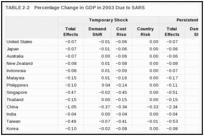It is hard to ignore the Coronavirus. It is kind of the biggest game changer right now, not only for the tragic mortalities, but for its economic impact and as a result, for its impact on international relations and national security. While its rate of expansion in China seems to be slower (see my previous post), it is appearing in various “hot spots” across the world. As of the moment I am writing this (after 1:00 PM Feb. 24) there were 80,350 confirmed cases worldwide and 2,705 deaths…assuming all the reporting is complete and correct. Right now in South Korea there are 977 cases and 10 deaths, in Italy there are 283 cases and 7 deaths, in Japan there are 170 cases and 1 death (and 3 from the cruise ships) and in Iran there are reported 95 cases and 16 deaths. There is a sense that the Iranian figures are low and the real numbers are higher. So outside of China there are pockets of disease in multiple locations.
See: https://gisanddata.maps.arcgis.com/apps/opsdashboard/index.html#/bda7594740fd40299423467b48e9ecf6
Beyond the immediate dangers the virus poses, there are the problems and cost of containment. China, in its efforts to control it, effectively shut down entire cities. Is that what Korea, Italy and Iran are going to have to do? This is a major economic hit.
The markets on Monday clearly picked up on this with the Dow Jones dropping over a thousand points yesterday. It is down 500 800 almost 900 points today. Markets in South Korea, Italy, etc. are getting hit even worse. Oil prices are also declining. Right now they are over $50 a barrel but they could decline to the low $40s. The exchange rate for the ruble has also declined to 65 to a dollar. Their economy and government budget is heavily impacted by oil prices. My post from 28 January:
This is clearly going to affect the world markets through this quarter and probably into the next quarter. If it is fully contained, then the economies will start to recover. The question is, can this virus be fully contained? Because of the rather “stealthy” way it spreads, with people apparently able to spread it before they show symptoms of the disease, it may take a while to fully contain. Suspect these are not the last outbreaks. Each outbreak then produces another round of costly containment efforts.
It has been estimated that the economic cost of the SARS virus of 2002-2004, which only included 8,098 documented cases and 774 deaths in 17 countries, cost 1.05% of the Chinese GDP in 2003. Hong Kong took the biggest with a 2.63% loss in GDP in 2003 while the U.S. economy had a negative 0.07% effect. It is clear that this virus is going to have a lot bigger impact. Right now, it is 80,350 cases, 2,690 cases outside of mainland China, and 2,705 deaths (with 42 of them outside of China).
One estimate is here: https://www.ncbi.nlm.nih.gov/books/NBK92473/
The Table 2.2 is here (and a lot less blurry): https://www.ncbi.nlm.nih.gov/books/NBK92473/table/ch2.t2/?report=objectonly

